I would be fibbing if I didn’t say there are easier places to travel to with dogs.
However, Albania is a stunning country, full of very kind people, and is definitely worth seeing – particularly now, before it becomes over-developed for tourism. Albania is inexpensive and easily accessible from Italy, Greece and other Balkan countries. Since it is not yet in the EU or Schengen, it is a useful bolt-hole for your 90-day Schengen Shuffle.
The attitude to dogs in Albania is changing for the better, and so long as you are careful and well prepared, there is no reason not to bring Fido. The most important thing to note are the preparations you need to make three to four months before you wish to re-enter the UK or EU from Albania with your dog – see Section B.
Pettravel.com lists the import requirements for 240 countries around the world. Further doggy travel tips, including printable packing checklists for travelling with dogs are all available in my Wuff Guide to Travelling with Dogs. Please note, we tour overland in a truck camper. This blog does not cover flying with dogs, public transport, or dog-friendly accommodation. For information on these subjects, I recommend Shandos Cleaver’s excellent doggie travel blog Travelnuity.
While every effort is made to ensure the information is correct at the time of writing, things change, so do check with the government website of the country you wish to visit before travel.

Contents:
- Before You Go
- Practicalities
- A. Entry Requirements for Dogs into Albania
- B. To Re-Enter the UK or EU from Albania
- C. Other Vaccinations and Medical Recommendations
- D. Getting to Albania
- E. Dog Food & Pet Supplies in Albania
- F. Finding A Vet In Albania
- G. Is Albania Dog Friendly?
- H. Hazards
- In Conclusion
- Animal Charities & Volunteering in Albania
- Adopting a Dog in Albania
- Our Previous Adventures Immortalised in Print!
- Read them for free with Kindle Unlimited.
- Useful? Pin It!
- Disclaimer
- Disclaimer
Before You Go
- Vaccinations
- You may need to start preparing for your trip at least four months before the date you plan to return to the UK/EU to give yourself time to get the necessary tests, vaccinations and paperwork in place.
- Ensure your dog’s vaccinations are up to date and remain valid for the duration of your trip.
- Banned Breeds – I could find no list of banned dog breeds in Albania. Click here for a list of banned breeds by country, and here for a list of breeds and the countries from which they are banned.
Practicalities
A. Entry Requirements for Dogs into Albania
For non-commercial transport to Albania, your pet will require the following:
- Microchip compliant to ISO 11784 /11785. If the microchip is non-compliant, you can bring your own scanner.
- Valid Rabies Vaccination – Albania recognises a 3-year vaccination. Albania is considered a high risk country for rabies by the UK government, and some neighbouring countries, such as Macedonia and Montenegro, only recognise a 1-year jab, so we had The Fab Four boosted before travelling to the Balkans.
- Bilingual Animal Heath Certificate – this proved very confusing. The vet in Italy was unsure about it. Although we did get a health certificate in the end, I’m not sure it was the correct document. However, our dogs were not checked at all when we boarded the ferry from Bari in Italy to Durrës in Albania. The Pet Travel Store offers a AHC service for Albania, but we have not used it ourselves. Their pet passports and vaccination records were checked thoroughly by Albanian customs as we left. Go figure!
B. To Re-Enter the UK or EU from Albania
Albania is an unlisted third country for the UK Government and classed as a High Rabies Risk Third Country by the European Union. This means that, without the correct tests and paperwork, which are not readily avaiable in Albania, your dog may not be permitted to re-enter the UK or EU without quarantine, if at all. You will need:
- Rabies Antibody Blood Titer Test – although it is not needed to enter Albania, it is a requirement to re-enter the UK and EU from Albania. A titer test is also a requirement to enter some nearby countries, such as Serbia. Note:
- An authorised vet must take the blood sample for testing by an EU approved blood-testing laboratory. This service is not widely available in Albania, although I have listed those vets who offer the service in the Finding A Vet In Albania section below.
- The test must be carried out no sooner than 30 days after the rabies vaccination. For the best chance of a successul titer test, a booster vaccine is recommended.
- Three Month Wait After a SUCCESSFUL Test – this only applies if the test was done outside the EU in an unlisted third country. Note that if the test fails, you need another rabies vaccination, another 30-day wait before the titer test, and another 3 month wait if applicable. Here are the references:
- The Your Europe website states that your pet can’t enter the EU until three months after a successful test. The website states, “In addition to the standard requirements (microchip, anti-rabies vaccination, anti-Echinococcus treatment where necessary, EU health certificate), your pet must have a rabies antibody test 30 days after their rabies vaccination and not less than 3 months before travelling to the EU. An authorised vet must take the blood sample for testing by an EU approved blood-testing laboratory.”
- The UK Gov website states “You must wait 3 months from the date the blood sample was taken before you travel – you do not need to wait if your pet was vaccinated, blood tested and given a pet passport in the EU before travelling to a country that is not listed.”
- EU Pet Passport or Animal Health Certificate. Note, to re-enter the EU without an EU Pet Passport, you will need a valid EU Animal Health Certificate issued within 10 days prior to entry. Klinike Farmaci Veterinare MTG in Sarande supplies health certificates.
- Echinococcus (Tapeworm) Treatment Is required to bring dogs into the United Kingdom, Finland, Ireland, Malta Northern Ireland or Norway. If you are travelling directly between any of these countries, there is no need to re-administer the treatment. Most vets should be able to administer the correct treatment, just ensure:
- Approved Treatment – The treatment given must be approved by the destination country.
- Administer between 24h & 5 Days Before Arrival – It should be administered by a vet no less than 24 hours and no more than 120 hours (1-5 days) before you arrive.
- Correct Recording – The treatment must be recorded correctly on the Pet Passport or Animal Health Certificate with the time of treatment shown in 24-hour format or you may not be permitted to travel.
- Point of Entry – You can only enter the EU from Albania with your pet through an authorised travellers point of entry in your destination country.
C. Other Vaccinations and Medical Recommendations
See Section 4 for more details on disease control measures. There are a lot of stray dogs in Albania, which may harbour diseases to which your pet has no resistance, so it is recommended that your dog is fully protected and up to date with:
- Vaccinations for rabies and other common diseases, such as DHPP.
- Worm and tick treatment.
- Leishmaniasis – a potentially fatal disease in dogs, which is rife in Southern Europe and the Mediterranean. Click here to find out about leishmaniasis and how to prevent it.
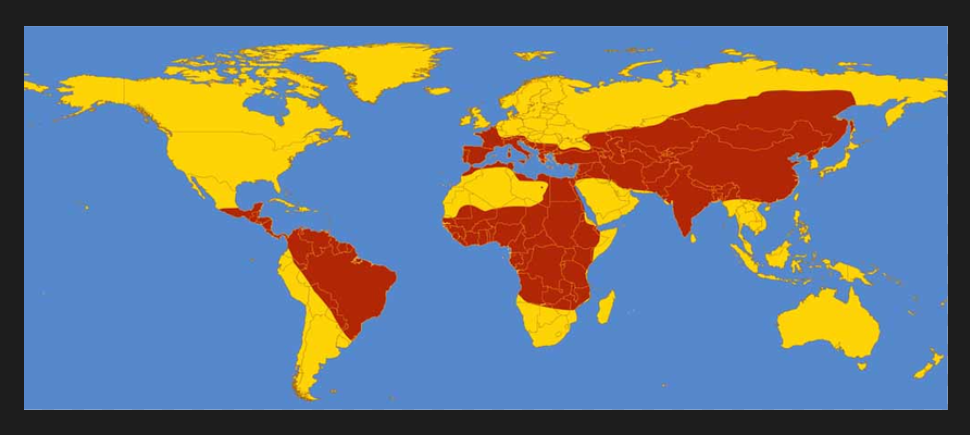
D. Getting to Albania
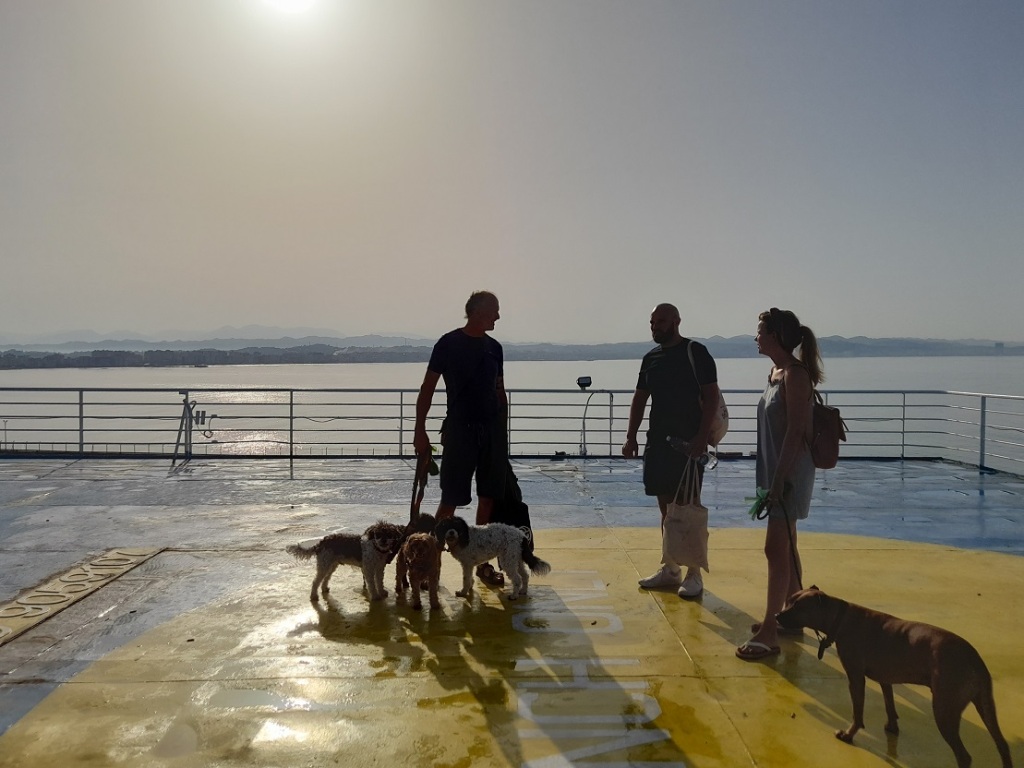
We had a pet friendly cabin on the overnight ferry from Bari in Southern Italy to Durrës in Albania.
E. Dog Food & Pet Supplies in Albania
- Voofla lists pet stores & pet services around the world, including Albania.
- Supermarkets – Large supermarkets and hypermarkets are not yet common outside the bigger cities in Albania, and have limited ranges of pet food brands, so it is worth stocking up.
- Spar International operates Interspar Hypermarkets and Spar Supermarkets. Click here for a list of stores. They offer online shopping in Albania, but their webshop is in Albanian.
- InterSpar – the hypermarket we found in Kashar, on the outskirts of Tirana, stocked Pedigree and Purina wet and dry food.
- Conad an Italian supermarket chain stocks Petfriends, its own-brand cruelty-free pet food. Click here for a list of stores. The main website can be viewed in Italian and Albanian, (Google Translate will convert Italian into English) but the online ordering seemed to be Albanian only!
- Small Shops and Markets – We could buy dry and wet food easily enough in other parts of the country, but not well-known brands and the quality was not the best. Our Ruby got a fungal skin infection which may have been due to the poor quality food we bought in the south of Albania, because it was all that was available!
- Vets – many vets in Albania stock pet food. Some of the ones I know who definitely sell food are:
- Fier – Animal Veterinar Hospital in Fier stocks Royal Canin and some other good-quality Italian and Greek brands of dog food, and was very good with nutritional advice. Dr. Andi advised that many dogs have allergies to chicken-based diets.
- Tirana – Klinika Pet Care stocks a variety of pet supplies and dog food brands, including Brit premium grain-free and Carnilove wild-origin grain- and potato-free food from the UK.
- Sarande – Klinike Farmaci Veterinare MTG has Royal Canin, Hills, Happydog, Acana, Orijen, Core and Profine.
- Sarande – Vet Sheme Çela imports dog food from Germany. If he doesn’t have it in stock, he can get it into his clinic within a few days.
- Rossmann and Lala – we were told this German company stocks pet food, but the store we visited in Kashar near Tirana didn’t! There are outlets around the country, so it may be worth checking. I emailed them to ask, but never got a reply.
- Online Delivery to Albania is not easy. None of the online petfood suppliers we use in the rest of Europe deliver to Albania. This includes Amazon, Bibita, and Zooplus, although if they did, they would not be subject to customs duties!
- Dogs Dogs and Cats of Saranda, Albania – is a Facebook group where you can ask pet-related questions (travel, food, medical care, supplies, grooming, strays, adoptions, volunteering opportunities, etc) and share fun dog and cat photos and videos.
- Restrictions on Bringing In Pet Food – I could find no restrictions around bringing pet food into Albania, so if you come from the EU, you could perhaps bring enough for a short trip. Click here for Albania’s customs site in English, which outlines duty free allowances. I emailed Albanian Customs and the Ministry for Tourism for clarification on pet food. Customs said: ‘if the type is not categorized as prohibited goods and the quantity is within the norms for personal use, there is no problem. However, when it comes to food, it is not only the competence of customs.’
Poo Bags
- These are not widely available, so bring your own.
Dog Grooming
- Tirana: Pet Grooming Salon Bora in Tirana is close to a couple of Park4Night spots, although we easily found parking for our 10m long Beast on the street nearby. There are lots of nice cafés and a few shops in this up and coming neighbourhood. Alban, the owner lived in the UK for several years and speaks excellent English. He has two salons, named after his beautiful Malamut, Bora! He is on Instagram. His second salon, @salloni_bora_pets_2, is near the lake.
- Fier: Animal Veterinar Hospital – our favourite vet in Albania also offers grooming services.
- Sarande – Klinike Farmaci Veterinare MTG – offers grooming services.
- Other cities – Voofla lists pet services by city, but we have not tried any of these and can only give personal recommendations for the two listed above.
F. Finding A Vet In Albania
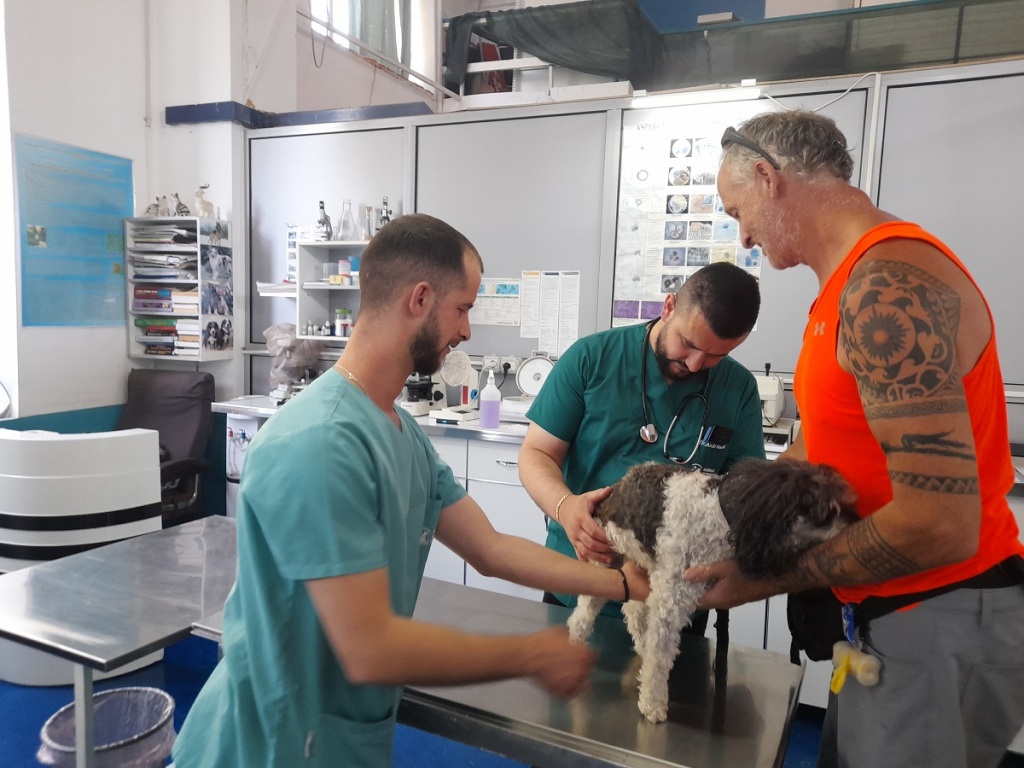
When our little Kai was bitten on the beach by a stray, we found it difficult to find a vet, never mind a good vet. Although The Professional Veterinary Order of Albania became a Full Member of FVE (Federation of Veterinarians Europe) in 2019, many vets in Albania do not have a website and it is not easy to check their credentials. I emailed them to get a list of approved vets, but have not heard back.
Do check that the vet is properly qualified. Kai’s initial treatment from the Victoria Vet Pharmacy in Vlorë nearly killed him. They did not clean his wounds, which were already infected, and although I asked for antibiotics, they injected Ivermectin, an antiparasitic for cattle sheep and pigs, which can be fatal in some dogs, particularly herding breeds such as collies. (Even eating poo from animals that have been treated with Ivermectin can cause a reaction in susceptible breeds.)
We had tried to do our due diligence: Victoria was recommended by another vet in the capital, Tirana, and appears on a list of trusted vets supplied by an animal charity. Maybe we were just unlucky on the day, but I can only tell you my own personal experience.
- Animal Veterinar Hospital in Fier – we can strongly recommend this Animal Hospital, run by Dr. Luiza and Dr. Andi and their nursing assistant An Ni. They have full diagnostic facilities and are as professional as any vets we have visited anwhere in Europe. Dr. Luiza was one of the first small animal vets in Albania. She trained and practised in Italy for many years, and also runs an animal rescue centre at the hospital in Fier. Dr. Luiza speaks Italian and English, while An Ni speaks very good English. The vets here also have contacts in Kosovo if you need a vet there.
- Trusted Vets – this is a list of trusted vets from Pro Quen, an Austrian animal welfare charity working in Schkoder.
- SHKODER : dr.vet. RUBIN PIRANAJ, Klinika Putrat, Rruga Hoxha Tahsim, Shkoder, AL. 00355 69 560 1111. Facebook Klinike Veterinare Putrat. Lisa, who adopted a street dog, gave us first hand recommendation for this animal hospital and diagnostic clinic. This vet offers the Rabies Antibody Titer Test that you will need to get your dog back into the EU. The bloods are sent to German for analysis.
- DURRES : Dr.vet. EROR ZYLYFTARI, Klinika Veterinare KLOER, Sheshi Selaniku, Durres, AL. 00355 69 317 7929
- TIRANA : Dr.vet. DORINA KOLLESHI MALA, Klinika Pet Care, Rruga e Durresit, Tirana, AL
- VLORA : FROM PERSONAL EXPERIENCE, WE ABSOLUTELY DO NOT RECOMMEND Farmaci Clinic & Hotel Veterinary “Victoria”, Vlora, AL, even though it’s on the ‘trusted’ list!
- Sarande – Klinike Farmaci Veterinare MTG was very friendly answering my questions in English while I was researching this blog. This vet offers Health Certificates (if you don’t have an EU passport) and the Rabies Antibody Titer Test that you will need to get your dog back into the EU. The bloods are sent to Germany for analysis, so the test will obviosly take a little longer.
- Here is a link to a list of veterinary clinics in Albania from the Animals Need Me Shelter, which works with Pro Quen in Shkoder. It includes pharmacies and clinics around the country.
- Voofla lists pet services, including vets, round the world and includes Albania.
G. Is Albania Dog Friendly?
It’s rare for Albanians to keep animals as pets. It is partly down to finance – many families do not have money or food to spare. Dogs are kept as working animals.
It is also cultural – dogs are seen as dirty and disease ridden, which is not far off the mark in Albania, so are generally regarded as vermin. In Albania, many people lost their lives during the COVID-19 pandemic. With no-one to look after their animals, this only exacerbated the problem with strays. There is a program to neuter strays and release them back on to the street – these dogs have a yellow ear tag.
Attitudes are changing – we met a vet in Berat who told us, “People are starting to understand the love,” and one restaurant owner described dogs as, “Angels”. We found that Albanians either adored our dogs, or were very frightened of them, with little in between. Outside major cities, you will not see people walking dogs. We got quite a few strange looks.
We found most restaurants reluctant to allow dogs indoors, but all were happy for the dogs to join us outside. It is polite to ask first, however.
As with Romania, since there are so many strays, there were no restrictions around letting the dogs run free on beaches and in other outdoor spaces. However, do be aware of the hazards listed below.
H. Hazards
Note that you will find most of the same hazards in any other European country. The difference in Albania is that there are fewer vets if you do have a problem.
1. Are the Locals Friendly?
- Stray Dogs & Shepherd dogs – the strays were friendly with humans, but considerably less friendly with dogs compared to the stray dogs we encountered in Romania. We became very wary of stray dogs after our little Kai was attacked by three dogs on the beach in Vlorë and badly bitten. They would have killed him if we had not acted quickly to drive them away. Shepherd dogs in any country are worth avoiding – their job is to defend their flock against wolves – and they don’t take prisoners. We have encountered shepherd dogs in the mountains of France and Italy. In Albania, we found the shepherd dogs tended to be much closer to home; we encountered them on beaches and in the villages rather than high on a hill with a lonely goatherd as we’d found in other countries. An Albanian suggested keeping our small dogs on a leash just to keep them close, because Albanian dogs are large and fierce and small dogs are not common in Albania. While there, we did hear four or five first-hand reports of small dogs being attacked by large strays, so don’t drop your guard.
- Feral Cats – they were everywere, and were unafraid of the dogs. Some cats even stalked and taunted the dogs! If they attack, they will use claws and go for the eyes. They can cause a lot of damage, so be wary, particularly since good vets in Albania are not widespread (see above for a list of vets).
- Poisoning – a French couple living in Albania with their three dogs warned us that putting down poison to control strays is commonplace, particularly in cities. We were told by others that this is not a current strategem, and hasn’t been practised for many years, but it is as well to be wary.
- Hunting – from March 2022, hunting has been banned totally for a further 5-years in Albania, so unlike in France, you are much less likely to encounter rifle-wielding madmen brimming with blood lust!
2. Climate; Overheating & Sun Protection – or Cold!
- Summer temperatures in Albania can reach the mid-40s, so pick your time to visit. Click here to see average temperatures and rainfall in the various regions of Albania.
- 10 Tips To Keep Hot Dogs Cool In The Heat gives advice on keeping your pup cool and safe in the heat.
- Many of the hiking routes do not have shade, although there is plenty of water to enjoy, with 446 km (277 miles) of glorious coastline, plenty of lakes, and beautiful river gorges. Sea breezes help to keep the temperature down near any large body of water, not just the coast. (Sea breezes come about because the land heats up more quickly than water, which causes the hot air to rise. This then draws in cooler air from above the water.)
- Winters on the coast are mild, but can be severe in the mountains. Check out Winterised World Wide Walkies – 10 Tips to Keep Chilly Canines Cosy for a winter trip.
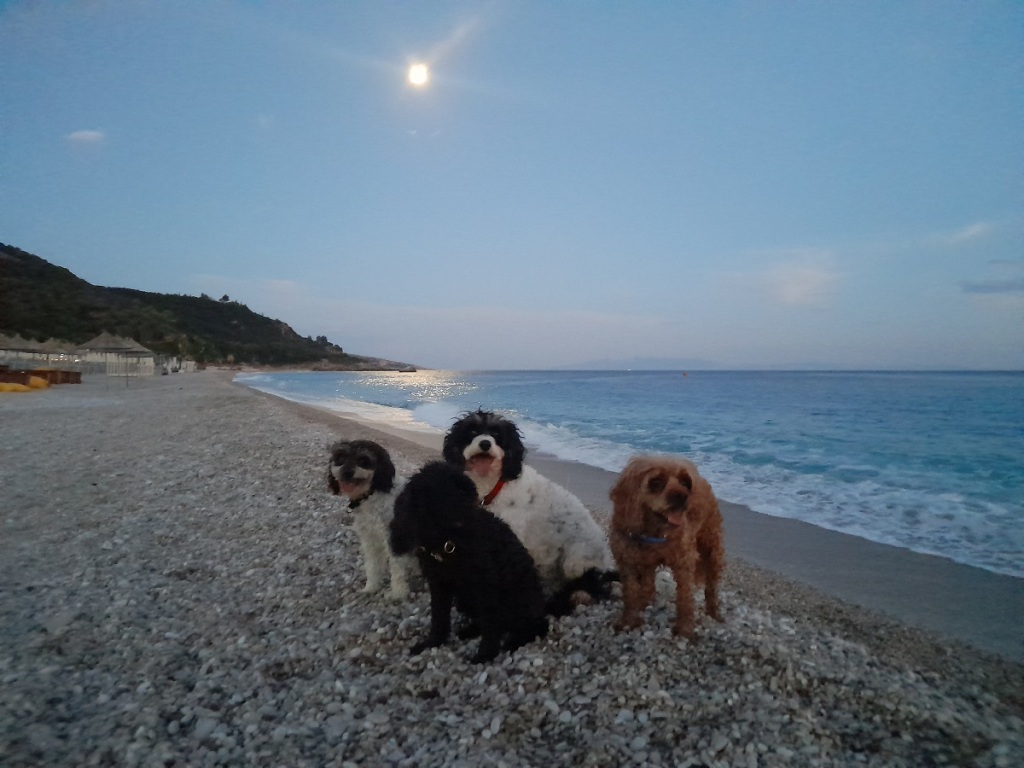
3. Dangerous Animals – Wolves, Bear, Lynx & Wild Boar
While in Albania, we did not see any of these, but they are there, so be aware in out-of-the-way places. You may be surprised to note that France and Italy also have healthy populations of all of these creatures, and we encountered a wild boar near the city of Potsdam in Germany!
- Wolves (Ujk, pronounced Uyk in English) in Albania belong to the Eurasian Grey Wolf subspecies. The current wolf population in Albania is estimated between 900-1,200 individuals, which are found in all types of woodland and forest areas, shrub lands, mixed forests, sub-alpine and alpine meadows. Wolves tend to predate deer, wild boar and livestock, so they follow sheep and goats into their summer grazing grounds in the mountains, and back to the lowlands in winter. Wolves are not found along the western lowland coastal zone of Albania, from Shkodër to Vlorë. Wolves are protected from hunting under Albanian law. Wolves are much maligned, and reports of wolf attacks on people by healthy wolves are almost unheard of.
- Brown Bear – Albania is home to a very small population of bears. While attacks are exceptionally rare, even when encountered directly on foot, bears may become aggressive if they feel threatened or surprised in some way. The greatest number of attacks occurs when a mother is protecting her cubs.
- Balkan Lynx – This is a very rare and unique subspecies of the Eurasian lynx. As a result of poaching, hunting, and habitat loss, it is estimated that no more than 50 of these animals remain in the wild, which places it at risk of becoming extinct.
- Wild Boar – the wild boar is the most widely distributed land mammal on Earth, so, as in the rest of Europe, there are wild boar in Albania. These are best avoided: particularly mothers with piglets. I couldn’t find details of their range in Albania, but their preferred habitat tends to be areas of dense vegetation for cover, with a permanent source of water. This includes forest, shrubland, swampland and agricultural areas.
- Other Animals in Albania – click here for a link to other wildlife in Albania – the non-threatening ones!
4. Disease Control Measures
a. What Diseases Are a Risk to my Dog in Albania?
There are a number diseases caused by bacteria and protozoa in Continental Europe that are rare or non-existent in the UK, so your dog is unlikely to have any natural immunity. There are also a lot of stray animals in Albania. Small animal vets are not commonplace, so the dogs are a reservoir of disease.
b. Transmission of Doggie Diseases in Albania
i. Rabies
Albania is considered a high risk country for rabies by the UK government.
Transmission – Rabies virus is transmitted through direct contact (such as through broken skin or mucous membranes in the eyes, nose, or mouth) with saliva or brain/nervous system tissue from an infected animal. Rabies is usually transmitted from the bite of a rabid animal. It is possible, but rare, to get rabies from non-bite exposures, which can include scratches, abrasions, or open wounds that are exposed to saliva or other potentially infectious material from a rabid animal. Other types of contact, such as petting a rabid animal or contact with the blood, urine or feces of a rabid animal, are not associated with risk for infection and are not considered to be exposures of concern for rabies.
ii. Other Diseases
Transmission of other diseases in Albania is largely through the usual suspects:
- Insects, such as:
- Ticks
- Mosquitoes
- Sandflies
- Worms, such as:
- Heartworm
- Tapeworm
c. Precautions
- Vaccination
- Ensure all your dog’s vaccinations are up to date and remain valid for the duration of your trip.
- Due to the high risk of rabies, you will require a rabies antibody titer test to re-enter the UK or EU. This blood test ensures that your dog’s rabies vaccination was effective. See section B above for more details. Note that this test is not readily available in Albania and may need to be carried out four months before entry to the UK/EU.
- A vaccination is available for Leishmaniasis is a potentially fatal disease in dogs. We strongly recommend getting the vaccination, since the dogs clearly showed signs of this disease in Albania. Click here to find out about the disease and how to prevent it. Leishmaniasis is very prevalent in Albania and southern europe. The vaccination is most effective one month after vaccination, so plan ahead.
- Collars or Spot-On Treatments for Insects & Worms
- Even if your dog is vaccinated against Leishmaniasis, you should still take other precautions to protect them.
- Bring enough worming and tick/sanfdly/insect repellent treatment for the duration of your stay, or find a reputable vet or vet pharmacy where you can buy suitable products. Note that some treatments may be ineffective against sandflies, and some 3-month spot-on treatments do not remain effective for the full 3 months against all insects. This is discussed in my blog on Leishmaniasis.
- Tapeworm – Avoid Raw Meat
- Tapeworm eggs are transmitted in raw meat, so make sure you wash your hands after handling raw meat, and don’t allow your dog to eat raw meat.
- General worming treatments do not cover tapeworm. To treat tapeworm, you will need a specific anti-echinococcus (tapeworm) treatment. Droncit is a common treatment.
- To re-enter the UK and some other countries, your dog will require an anit-echinococcus treatment between 24 hours and 5 days before arrival. See section B above for more details.
- Stay Indoors When Insects Are Active
- Keep your dog indoors at dusk and dawn, when insects such as mosquitoes and sandflies are more likely to be active.
- Note that it’s not just dogs, but you can be susceptible to some of the insect-borne diseases.
- Check Daily for Ticks
- Check for ticks and remove them immediately. Tick prevention (such as ‘Frontline’) is not 100% effective and ticks carry quite a few lethal diseases, particularly in Mainland Europe. Note that some three month treatments are not effective against ticks for the full three months, so check the leaflet. My blog on Leishmaniasis has more information.
- We carry a Tick Twister (NOT tweezers) with us at all times and have found this cheap option to be the most effective for tick removal by far. When removing the tick, do not squeeze the body, or disease-carrying fluids can be squeezed back into your dog. Make sure that you remove the whole tick, including the head. It should be live and wriggling when removed. Dispose by drowning in a jar of alcohol – don’t squash it, as this potentially releases diseased fluids that can be hazardous to you. Flushing down the loo won’t kill it! You can keep the tick sellotaped to a card for testing and identification later.
5. Poisonous Snakes
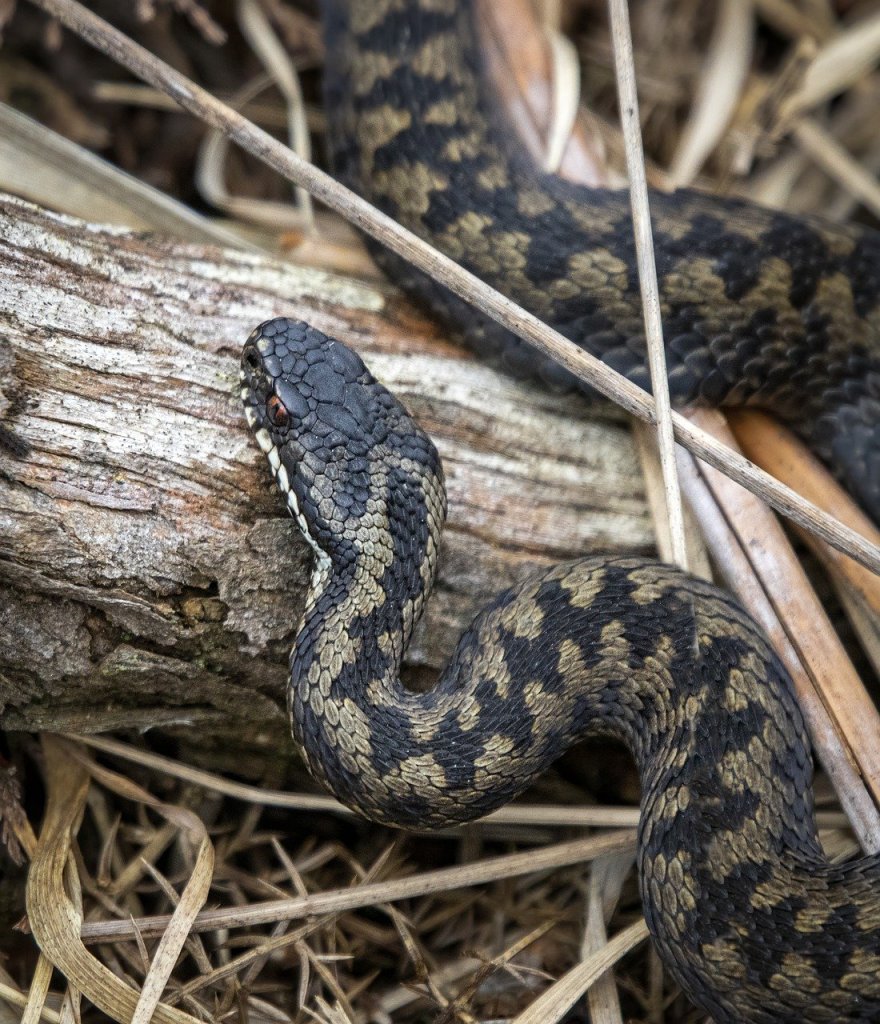
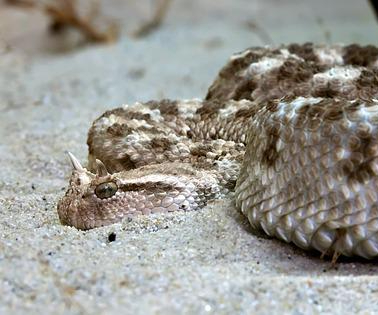

Estimates suggest there are sixteen or seventeen species of snake in Albania, although most are harmless. As in the UK and the rest of Europe, the vipers (or adders) are the ones to look out for, but snakes are usully shy and do not attack without provocation. Please note that these snakes are rare and protected, so never harm them!
In the unlikely event of your dog being bitten, a photo of the snake is helpful, but don’t risk getting bitten yourself, particularly by trying to pick up the snake. Snakes are protected, so it is a crime to harm them. Signs of an adder bite will be significant swelling and pain around the bite along with depression or lethargy. Try to keep the dog still to prevent the venom from spreading and seek veterinary help straight away. Complications are rare and with prompt treatment, you can expect your dog to make a full recovery within a matter of days.
Obviously, smaller dogs will be more susceptible to complications due to proportion of toxin to body size.
Click here for a list of snakes in Albania with pictures. The ones to watch are:
- European Horn-nosed Viper (Nepërka in Albanian)– Easily identified by the unique horn emerging from the snout. The nose-horned viper (also known as a long-nosed viper, sand viper, and horned viper) is the most dangerous snake in Europe, due to its large size, long fangs, and toxic venom. Its bite can be fatal even in some humans.
- Common European Viper (Nepërka me lara e malit) – Found throughout Europe, including the UK, this snake is not the most venomous, but it is responsible for more bites than almost any other snake. Symptoms include pain, swelling, blisters, and tingling. Respiratory failure only occurs in a small number of untreated cases, mostly among the old, young, or sick.
- Meadow Viper (Nepërka e vogël e malit) – Very rare and highly endangered, this viper is found in the mountains of northern Albania.
- The Cat Snake and Eastern Montpelier Snake are considered venomous, although they are not dangerous as the fangs are at the back of the mouth and the venom is only injected as they ingest prey.
6. Scorpions
We were told scoprions are not common in Albania, but they are there.
Of the three Albanian species; two are blackish brown and are less toxic than the more venomous orange-yellow scorpion, Mesobuthus gibbosus, which is about 75mm long, and may be aggressive if disturbed. This scorpion is also found in Greece, Macedonia, Montenegro, Bulgaria and Turkey.

There are no recorded human fatalities in the last decade from sixteen hospitalisations due to scorpion stings in Albania. Thankfully, although scorpion stings are painful, they are not usually fatal to dogs. As with snake bites, smaller dogs will obviously be more susceptible to complications due to proportion of toxin to body size. Click here for the signs to look out for. (The most dangerous scorpion species are found in parts of the USA, Asia, Brazil and Israel.)
7. Other Hazards
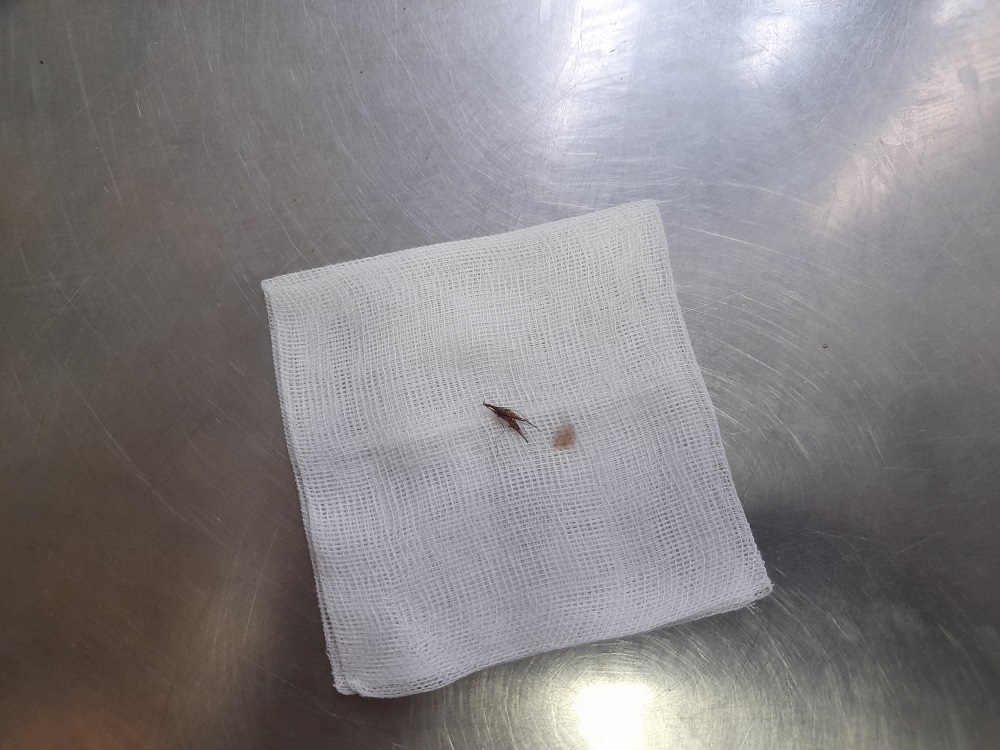
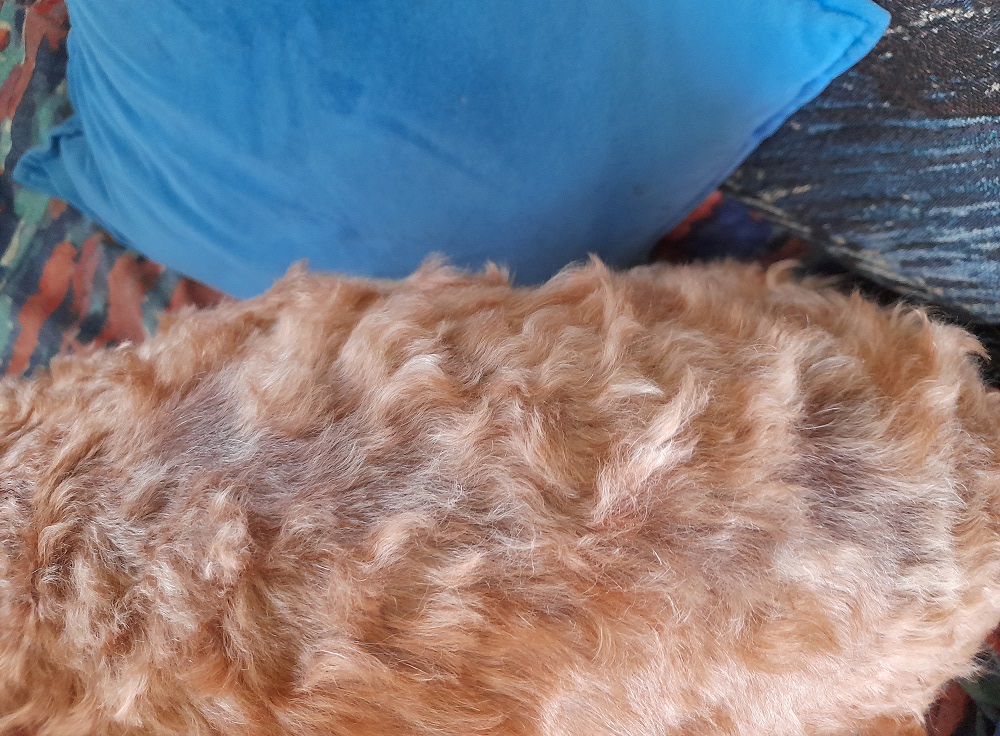
- Poisoning – a French couple living in Albania with their three dogs warned us that putting down poison to control strays is commonplace, particularly in cities, although others have told us that this no longer happens. It will pay to be beware, just in case.
- Trash – there was garbage everywhere. We heard reports of glass on beaches but didn’t see it, beyond the wave-smoothed sea glass. There were a lot of broken bottles at our park up in Lake Ohrid – I think from kids coming there to drink. There were certainly plenty of aluminium cans in various states of corrosion on the beaches, so a sliced pad was not out of the question, although the tourist areas of most beaches were kept clean.
- Grass Darts – we visited in May/June/July and both Ruby and Lani had to have sharp grass darts removed by the vet from deep inside their ears. They were not visible from the outside, but we knew there was a problem as they shook their heads and continually scratched their ears. Ruby also had a vet visit in Italy for the same problem. Both had infections from the grass darts, which needed treatment with ear drops. Grass darts can also pierce the skin and cause infection, so do check your dog’s coat and in between the toes and pads. Grass darts can be a problem in any country, including the UK. Dr. Andi showed us footage of an operation he did on a cat’s eye to remove a grass dart that had entered through the nose!
- Poisonous Plants – we saw Deadly Nightshade and Cuckoo Pint. You will find these in the UK too, so don’t panic. Just make sure your dog doesn’t eat them! See The Deadly Dozen – 12 Poisonous Plants Which May Be Common In Your Back Yard for more information on a few of the more hazardous common plants.
- Blue green algae – cyanobacteria; the clue is in the name – the cyanide-containing alage is toxic to both humans and dogs. Do not swim or let your dog swim in any water that looks like it might contain an algal bloom. If they do, wash them with clean water straight away.
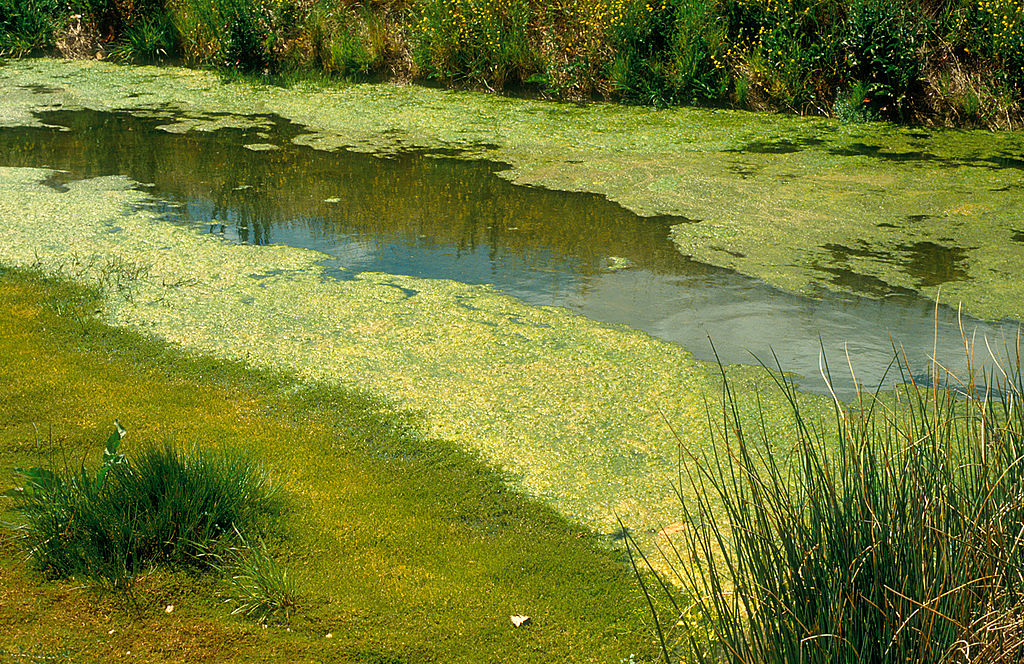
- Water – If your dog likes water, walk by a river, lake or the sea so that they can cool off. Swimming is good exercise, although do be aware of safety hazards such as tides, currents, submerged obstructions or pollution in the water. Make sure your dog doesn’t swallow too much water while swimming, which can lead to water intoxication or bloat. If they have been in the sea, be sure to rinse off salt, which can dry and irritate the skin. Ingestion of too much salt can be toxic. Sand can also cause intestinal blockages, so be cautious about to many games of fetch on sandy beaches.

- Pine and Oak Processionary Caterpillars – These are found in Albania, so do be wary during the times that the caterpillars are active (between September and March-ish, although they can be active later in cooler climes). You ONLY need to worry about caterpillars in OBVIOUSLY INFECTED PINE or OAK TREES at the time of year WHEN THE CATERPILLARS ARE ACTIVE. They are a risk because their spiny hairs contain a toxin which can be fatal to dogs and very harmful to humans. The hairs don’t need to be on a caterpillar to cause a problem. Hairs are shed in the nests and around infected trees, so even if the wind blows dust from under pine trees into your face, or your pup walks on the litter under a tree and then licks his paws or treads it into your RV, it can mean trouble. The moths themselves are harmless.
- Symptoms – The symptoms to look out for in your dog are drooling, salivating, vomiting, drowsiness or listlessness followed by irritation (rubbing) and swelling of paws and face. The severe swelling of lips and tongue can also cause breathing difficulties. Infected tissue can die and fall off. Our friend’s dog lost three quarters of his tongue due to contact with pine processionary caterpillars in Spain.
- Treatment – Go to a vet immediately. Prompt treatment will save your dog’s life. Methylprednisolone, an anti-inflammatory steroid is one treatment indicated in cases of caterpillar toxicity, but this should be administered only under the care of a vet since dosages vary. A homeopathic remedy, Apis is also suggested. As a scientist, I do have my reservations about homeopathy. Nevertheless, reports suggest that Apis helps as a first-line treatment against caterpillar toxins HOWEVER, do not let this deter you from seeking immediate veterinary treatment.
- Preventative Advice – is to simply steer clear of infected pine and oak trees in spring (you will see the white nests.) September to May are times to be vigilant, although the caterpillars are not active throughout this period; it will depend on the climate and weather in the area where you are staying. The best advice is to ask locally.
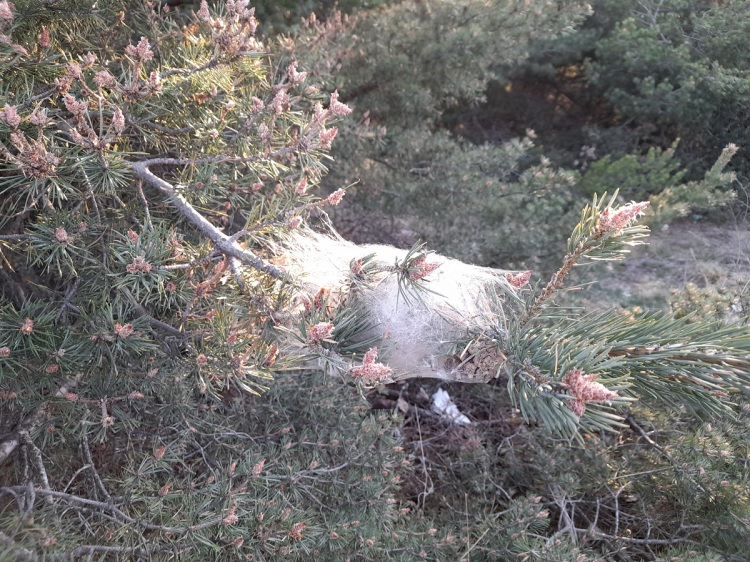
In Conclusion
I hope that you find this information helpful in keeping you and your dog safe. Although we had one or two problems, which really could have happened anywhere in the world (grass darts, a skin infection, and a dog attack), we had a wonderful time in Albania with The Fab Four.
Further doggy travel tips, including printable packing checklists for travelling with dogs are all available in The Wuff Guide to Travelling with Dogs.
Animal Charities & Volunteering in Albania
There are a lot of dogs in need. This post covers the subject in more detail, but in the meantime, if you would like to help stray dogs directly, the Animal Veterinar Hospital in Fier runs a sanctuary for dogs and cats. Their love of animals is absolutely clear and we are so grateful to them for saving our little Kai’s life after he was attacked and badly bitten by stray dogs.
By giving direct, we know that the money is used solely for the benefit of the 4 Paws. The vets provide their work and expertise to strays free of charge, but need the money for food and medicine. You can make a donation via Paypal on animalhospitalveterinary@gmail.com. Any amount would be much appreciated! If you do not have Paypal, you can donate direct by bank transfer. The details are given below:
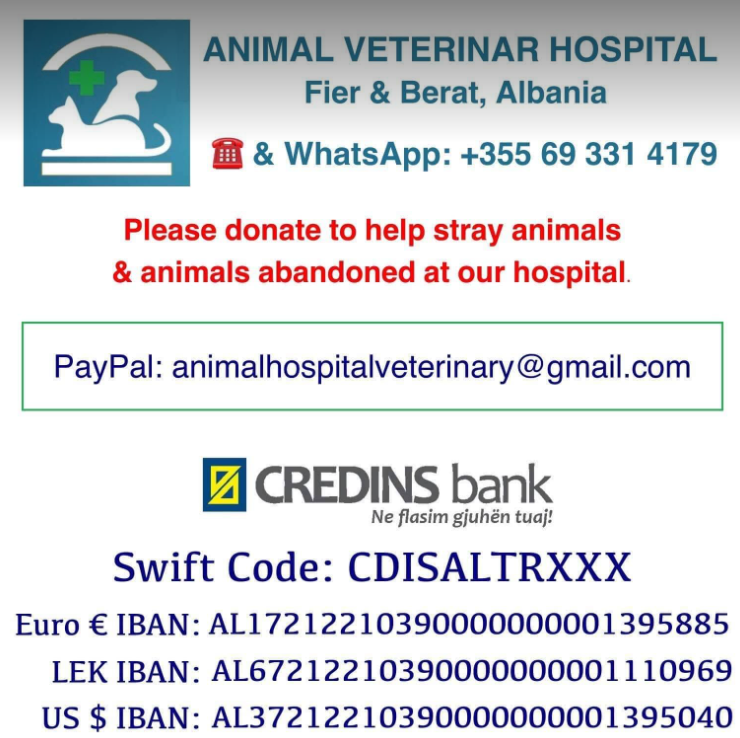
Adopting a Dog in Albania
This post from Holly Brega describes her own experience of adopting a stray dog in Albania.
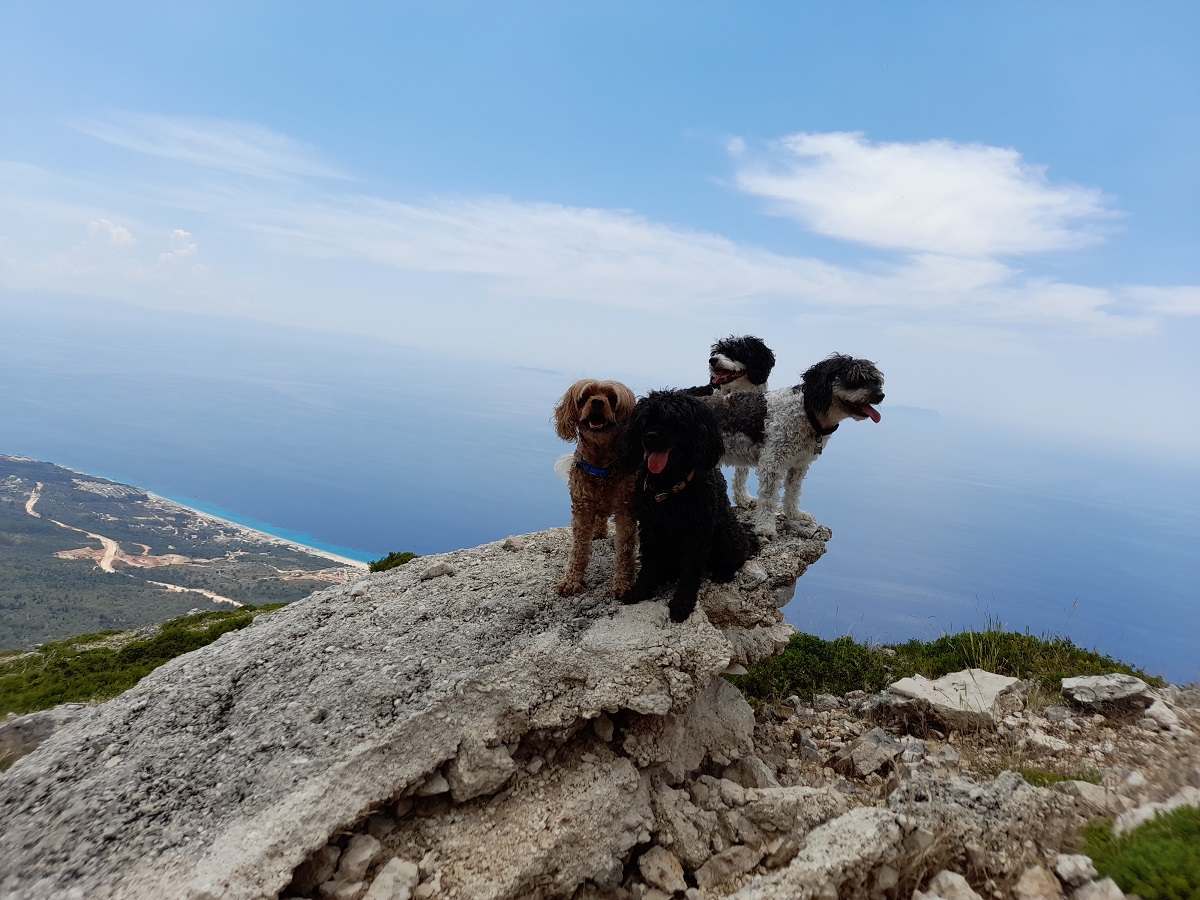
Follow Us To Get Doggie Travel Tips Delivered Straight Into Your Inbox!
Our Previous Adventures Immortalised in Print!
Read them for free with Kindle Unlimited.

Prime members can enjoy three months of Kindle Unlimited for no extra charge. Membership includes millions of titles, selected magazines, and thousands of audiobooks. Deal terms and conditions apply.
If you don’t want to join Prime, click here for a free 30-Day trial of Kindle Unlimited.

Useful? Pin It!
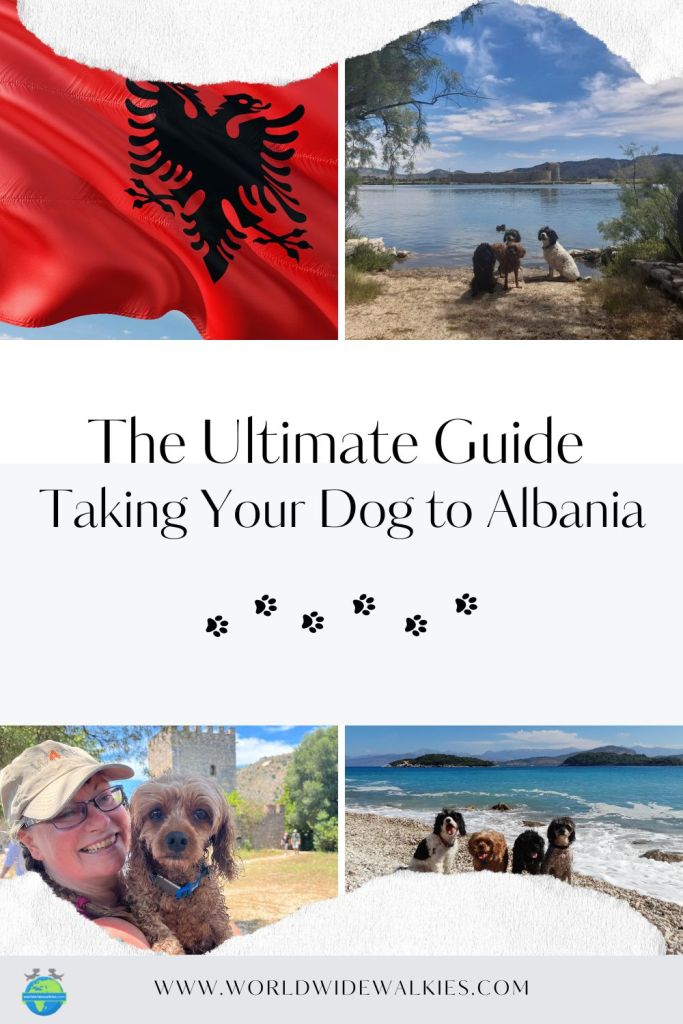
Disclaimer
Disclaimer
While every effort is made to ensure that the information given is correct at the time of writing, all content provided on this blog is for informational purposes only. The owner of this blog makes no representations as to the accuracy or completeness of any information on this site or found by following any link on this site. The owner will not be liable for any losses, injuries, or damages from the display or use of this information. Please see my Disclaimer for more details.

As one of those people who are very scared of dogs, please be considerate if you see someone suspiciously eyeing your dogs, appearing to be “frozen in place” (a very common symptom of a severe phobia), flinching, visibly sweating or looked extremely pale or flushed. In this case, keep the dogs closer to you and above all, give the person ample space so they can move forward without getting too close to the dogs. Being scared of dogs isn’t being childish or fussy, it can’t be cured on the spot, it’s not something people do on purpose to give dog owners a difficult time and most importantly, it’s not funny! (You wouldn’t believe how often I’ve been chided or openly laughed at.) With a little attention to the people around you, some patience and empathy and a dash of consideration, I fully believe this world can be comfortable for both dog lovers and dog skeptics. Thank you for reading this and spreading the word among other dog owners! 😊
LikeLiked by 1 person
I am more than happy to share your response – you make an excellent point.
I completely understand that not everyone loves dogs – my father has an almost pathological fear of dogs and I know it’s not funny. We never take our dogs to his house, and make arrangements for dog sitters when we go to see him.
I am so sorry to hear that you have been chided or laughed at. That is unacceptable. We all need to practise tolerance and understand that not everyone is the same as ourselves.
Dog phobia is something we are particularly conscious of during our travels. Some nations and religions are not dog lovers, and we try to be respectful of that.
I will share your comment on my Social Media. As responsible dog owners, it is very important to be mindful that not everyone shares our love and I completely agree with your point that with a little consideration, there is a world that can be comfortable for both.
Thank you for stopping by to comment. xx
LikeLike
Hello! We are traveling to Albania with our pet rabbit. We contacted the authorities and they said we only need health certificate, but it has to be translated to Albanian. We are traveling from Turkey via Greece and the Greek authorities sent us the certificate in PDF in Greek/English, but we can’t find anything in albanian language for Albania. And we have no idea how to translate the certificate (first of all, no albanian translators nearby, second of all – should it be notarized to look official??) Plz advice how did you do with having your certificate to be in Albanian language. If you know the website where we can download the papers, plz share. Thanks a lot! great article!!!
LikeLiked by 1 person
Hi Tara – thank you for dropping by. I’m glad you found my article helpful, although it does relate to dogs, cats and ferrets. I’m not sure of the requirements for bunnies.
The Pet Travel website is very helpful. This is a link to the entry requirements for Albania. https://www.pettravel.com/immigration/Albania.cfm
The website does offer an Albanian Health Certificate service, but it seems to be for if you’re travelling from US or Canada. You could contact them and ask – they are experts.
We tried to get an Albanian Health Certificate from a vet in Italy. After much to-ing and fro-ing and telephone conversations with the chief vet in the area, we got a certificate in Italian, (not translated into Albanian), and had it verified by a different stamping office, but I’m not even sure it was the right thing. It just verified the rabies jabs. I would have thought vets in southern Italy near the ferry connection with Albania would have known the requirements, but they didn’t seem to.
When we went through customs in Bari and Duress, nobody even looked at our animals’ paperwork – and no-one has looked at their paperwork since, and we have passed through most of the Balkan countries and even back into the EU via Croatia.
I’m not saying you shouldn’t try to get the correct paperwork, since it’s inevitable that if you don’t have it you will be stopped, but I am still a little unsure about exactly what is required!
You could alo contact the Animal Vetinar Hospital in Fier, which I mention on my blog. Luiza Hyka worked in Italy and speaks English. They might be more able to shed light on what is required.
I hope that helps. I’m sorry I can’t give you any more information.
LikeLike
PS – if you find out anything definitive, let me know and I will add it to the blog!
LikeLike
Hi, thank you for your superbly detailed post. Please could i just clarify one point regarding the rabies titre test? We are transiting Albania with our dog entering from Montenegro and exiting into Greece. Our dog has an EU passport. Do we need a titre test to exit Albania and if so, must this be done in Albania or can we have it done prior to entering Albania? Your help on this would be greatly appreciated.
LikeLiked by 1 person
According to the Pet Travel website, a titre test is required to enter Greece from a high rabies country. Both Albania and Montenegro are on the ‘High Rabies’ list. https://www.pettravel.com/immigration/Greece.cfm
You will not easily be able to get a titre test in Albania. The blood has to be sent for testing to an official EU laboratory, so I would recommend getting the test done while still in the EU. Note that provided the test results are within acceptable limits, your pet cannot enter Greece until 3 calendar months after the test is passed.
I hope this helps!
LikeLike
Hi Jacqueline,
Thank you for the quick reply.
<
div>Th
LikeLiked by 1 person
If the titer test is performed while the animal is in the EU and the results are above the minimum acceptable amount, the titer is valid immediately. The three-month wait is only required if the test is performed outside the EU. *this does not include the time required if the rabies vaccination is not current
LikeLiked by 1 person
This is really confusing for me. So if my dog is tested in EU, then travels to Albania and then travels to EU, everything is ok? Where is the logic? Also the entry point… Is there anybody who actually follows these rules? What should I do? I don’t want to get stuck in Albania because of some missing rabies test or get a fine because I didn’t visit an entry point.
LikeLiked by 1 person
Yes, your dog needs to have a titre test in the EU, because the blood must be tested at an EU approved laboratory.
The titre test remains valid forever (in most countries) so long as you keep your rabies vaccinations up to date. Just be aware that some countries do not recognise the 3 year rabies jab, and require annual boosters.
These are the rules.
But not all borders follow the rules.
The only time our dogs’ passports were checked was when we left Albania, but we were just unlucky that we had a very grumpy border guard.
We were unable to cross our of Albania at one border because we couldn’t get border insurance for our vehicle – I sense we wouldn’t have been checked there. (see my latest blog, Going to Macedonia.)
No one checked their passports on the rest of our trip, uncluding when we re-entered the EU from Montenegro to Croatia.
If you choose not to stick to the rules, you might get away with it, but there is also a small chance you will get caught.
The other reason to have a titre test is not just to comply with the rules, but to protect your dog. The test confirms that the rabies vaccine was effective. The requirement for having the rabies jab and test is because these are high rabies countries.
Rabies is incurable and 100% fatal.
I hope that helps to clarify!
LikeLiked by 1 person
No problem – happy travels!
LikeLike
Hi! Was re-rereading this post – so much good information – and wanted to let you know a pet store I contacted in Vlore does not carry the food we wanted (Acana) but could order it. Their price is actually less than what we saw in a pet store in Italy. I contacted them via WhatsApp before arriving in Albania using google translate.
As you mention in this post about going back to the EU & know you’ll have a lot of readers, the ASL vet in Brindisi told me that if I wanted to return to Italy from Albania, the rabies vaccination had to be less than a year old as Italy does not recognize three-year boosters. He mentioned it after seeing I had a three-year booster from Croatia where year one will end soon. I know some countries are more strict than the EU directive (per the manufacturer), but I wasn’t aware that Italy was one of them.
LikeLiked by 1 person
Thank you for that, Sheila. I’m glad you managed to source your favourite brand of food – and cheaper too! It just shows how we’re charged the market price in the EU!
I can’t remember whether I knew about Italy not accepting the 3 year jab from some countries. We did have The Fab Four boosted in Italy before we went to Albania, both to make sure they were fully protected and because one of the countries we were returning through did not recognise the 3 year jab! We came back through other Balkan countries into Croatia, Slovenia and Italy.
LikeLike
Great, and very helpful, article. Just in case: We’re in Tirana now, with a rabies vaccinated dog (with an EU passport) but we didn’t get a rabies titer test before arriving. Doh!
We are having a lot of trouble finding a vet who’s able to help here, so if anyone has any successful experience organising the test with a vet in Tirana, please reply. If not, I think a road trip to Fier might be needed! (Don’t want to risk issues at EU border.)
Thanks, Paul
LikeLiked by 1 person
Glad you found it helpful, Paul.
Getting a titer test in Albania will be difficult, becuase the blood has to be tested by an EU approved laboratory of which there are none in Albania.
I would suggest maybe contacting one of the rescue centres to see if they can help, since to rehome dogs in the EU, which have to be titer tested, so they will have contacts in place to sort it out. We met a German lady who did this to bring home a stray she picked up. There are contacts in the blog.
You could drop the veterinary hospital in Fier a line via Facebook. Dr Luiza worked in Italy, so may have contacts there.
I don’t recommend risking issues at the EU border, but our dogs’ paperwork was not checked at any border, including when we re-entered the EU via Croatia.
LikeLike
Just a follow up to this: I went to the Vet Hospital ( Rruga Hiqmet Buzi, Pranë Liqenit të Thatë, Sauk Vjetër) on 31 January and today (2 April) picked up the paper copy of the completed test. We received an email copy mid-February but it seems there was a delay with the paper copy. It cost 22,000 lek (a little under 200 Euros).
It wasn’t perfect, but everything in order – sent to accredited testing facility etc. Thanks again for the advice.
LikeLiked by 1 person
I would like to know if small dogs can travel on the public bus in their carrier. All the best
LikeLiked by 1 person
Hi Alfonso, I checked with my Albanian friends, and they said “travel with a small dog in the small cage is OK with the owner together on the buses.”
So it sounds like it’s okay, but I can’t guarantee it.
LikeLike